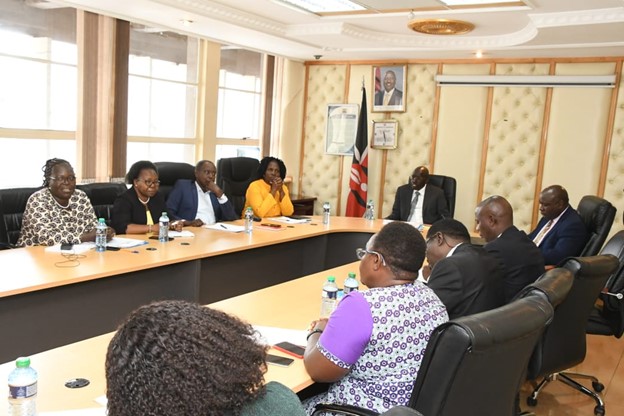
From September 24th - 30th, 2023, officials from Uganda’s Ministry of Education and Sports visited Kenya for a five-day benchmarking exercise aimed at providing firsthand insights into Kenya’s successful management of Competency Based Curriculum (CBC) and Competency Based Assessment (CBA) reforms. Key participants included technical staff from Ministry of Education and Sports departments and agencies in Uganda.
Speaking on the first day at the Kenya Institute of Curriculum Development (KICD) in Nairobi, Dr. Cleophas Mugenyi, the Head of the Ugandan Delegation and Commissioner for Basic Education, emphasized that the visit would serve as a valuable learning opportunity. He mentioned that it would enable them not only to gather insights from Kenya regarding the implementation of CBC and CBA, but also to enhance their own education system in Uganda:
“Uganda is having a paradigm shift in education, and we are in the process of transitioning our primary education curriculum from knowledge-based to competency-based, along with the piloting of the Early Grade Math Assessment (EGMA).”
Dr. Mugenyi highlighted Uganda's choice of Kenya for a valuable learning experience on the CBC. He emphasized that this experiential visit would effectively align curriculum, assessment, and pedagogical practices in Uganda's curriculum development process. He also expressed a willingness to share Uganda's experiences to facilitate mutual learning.
Martha Ekirapa, the Kenya Primary Education Equity in Learning (KPEEL) National Project Coordinator, commended Kenya's progress in implementing CBC and policy reforms to enhance the 21st-century education system. She credited this progress to the strong political will in Kenya, where education policies are prioritized and receive significant funding from the national budget. Ekirapa highlighted Kenya's focus on individual learners within the CBC, promoting the nurturing of each child's potential and providing special considerations and funding for learners with special needs. Ekirapa acknowledged challenges in implementing CBC, particularly in managing large classrooms, and emphasized encouraging group learning setups for active learner participation. She noted that Uganda was one of several countries benchmarking Kenya's CBC implementation and mentioned that the exchange tour would continue until September 29th.
Over the following days, the delegation explored diverse educational institutions in Kenya, such as the Kenya National Examinations (KNEC), Kenya Institute of Special Education (KISE), Machakos Teachers’ College, and engaged with Ministry of Education (MoE) officials to delve into insightful discussions regarding both the achievements and challenges encountered in implementing CBC. Additionally, they paid visits to institutions like Machakos School for the Physically Handicapped, Ngala School for the Deaf, and Moi Primary School. These visits allowed them to witness firsthand the impact of the CBC system, emphasizing a learner-centered approach, as they observed the curriculum in action across schools in Machakos and Nakuru counties.
The event concluded with an exit meeting chaired by the principal secretary, Dr. Belio R. Kipsang. Others in attendance included Director-General of Education, the Director of Secondary Education, the Coordinator KEEPL, the Secretary of Administration, officials from UNESCO/IICBA and the Kenya MoE, the Ugandan delegation, and the press. During the meeting, Dr. Cleophas Mugenyi, the Head of the Ugandan Delegation and Commissioner for Basic Education, presented Uganda’s observations in Uganda’s key focus areas including CBC, CBA, teacher education, and inclusive education and the delegation’s key takeaways from the benchmarking visit which he summarized as follows:
"The implementation of CBC and CBA revealed significant insights. Firstly, a multi-stakeholder engagement approach is vital for effective CBC implementation, emphasizing collaboration over competition. Secondly, integrating ICT through networking, resourcing, capacity building, and policy guidance positively influences the learning process. Thirdly, providing alternative pathways for diverse learners enhances access to learning opportunities. Fourthly, the provision of ICT and multiple assessment approaches aligns with effective competence-based assessment management. Fifthly, the Professional Teacher Education curriculum enhances teachers' competence to manage and deliver the CBC and CBA, emphasizing the importance of teacher retooling for professional development. Lastly, inclusive education thrives with functional structures and community involvement, underlining their pivotal roles in sustaining innovations within inclusive institutions. These lessons collectively guide a more effective and holistic approach to implementing CBC and CBA."
